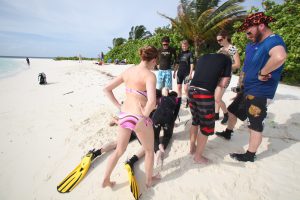As our CME accredited Diving and Marine Medicine course in the Maldives hoves into view in October Dr Rob Conway, founder of award winning marine conservation charity Blue Ventures, looks at Malaria and its risks to diving.
An increasing number of us are heading to more remote areas to discover that dream dive, which means that you may be exposed to an increasing number of diseases.
Malaria is common and caused by the parasite Plasmodium. There are several different types that effect humans, most commonly Plasmodium falciparum. The others are less common and cause a milder form of the disease that is rarely fatal.
Malaria is transmitted by female mosquitos (Anopheles sp) that bite from dusk. Males feed on plant nectar and so do not transmit malaria. They transmit the parasite whilst feeding on your blood. These migrate to the liver and over 7 to 30 days multiply before bursting and infecting red blood cells in waves. Therefore an infected individual may feel waves of fever that are characteristic of the disease. Other symptoms include severe headache, shivering, arthralgia (joint pain) and vomiting all of which may be confused with a diving related illness. Signs include enlarging of the spleen and anaemia. In severe cases there is blood in the urine, renal failure, seizures, coma and death.
If you are heading to an endemic area be smart. Avoid getting bitten by using a suitable repellant, wear long sleeves and trousers from dusk and sleep under a net. Take an anti-malarial medication for the correct amount of time. The most common drugs include mefloquine (Lariam), doxycycline (an antibiotic) and a combination of atovaquone and proguanil (Malarone). There is no evidence that any of these are contraindicated in SCUBA, but efloquine is not universally accepted by all doctors and there is little data on Malarone at depth. Each has its own benefits and pitfalls. Some require you to take them for a period of time before and after a trip, remember, the parasites life cycle can be over a month. Consult a physician before departing.
If you suspect malaria, seek medical treatment immediately. Look for flu like symptoms from 7 days after entering a malarial area. Work along the lines of it is malaria until proven otherwise. I evacuated someone from Madagascar on a diving expedition with convulsions, I had no idea at the time of the cause, it turned out to be malaria. If you are going remote then there is a rapid test available (ICT kit) and take a stand by emergency treatment with you such as artemether-lumefantrine (Coartem) or quinine plus doxycycline.
